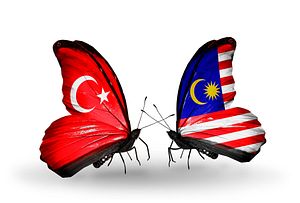On Thursday, Malaysia and Turkey concluded a Free Trade Agreement (FTA) between the two countries in Ankara. The agreement was signed by Malaysia’s Minister for International Trade and Industry Datuk Seri Mustapa Mohamed and Turkish Economic Minister Nihat Zekbejci, witnessed by Malaysian Prime Minister Najib Tun Razak and Turkish Prime Minister Recep Tayyip Erdogan.
The agreement comes after the two countries began exploring the feasibility of establishing an FTA between them in late 2009. Initial negotiations between the two countries were held in early 2010.
According to Bernama, Malaysia’s national news agency, the FTA is expected to boost bilateral trade to $5 billion by 2018. Currently, bilateral trade between Malaysia and Turkey stands at $1.1 billion. Over the past year, bilateral trade increased 86 percent, highlighting burgeoning economic ties between the two countries. The agreement is Malaysia’s seventh bilateral FTA following its agreements with Japan, Pakistan, New Zealand, Chile, India and Australia.
The Malaysia-Turkey FTA will allow for preferential market access for Turkish goods in the Malaysian market and vice-versa. Furthermore, it will facilitate trade in other ways including reducing customs barriers, and red-tape. The agreement also allows Malaysia to lock-in tariff preferences “that were either on par with, or better than, those previously granted under Turkey’s Generalised System of Preferences (GSP), which were no longer available for Malaysia, beginning Jan 1, 2014,” according to Bernama.
“The Prime Minister (Recep Tayyip Erdogan) and I are both strongly committed to bilateral partnership, and there is no clearer example of this commitment than the Malaysia-Turkey Free Trade Agreement (FTA), which we will witness later today,” Prime Minister Razak said in a keynote address at the Turkey-Malaysia business luncheon hosted by The Union of Chambers and Commodity Exchanges of Turkey. In noting the similarities between Turkey and Malaysia, Razak pointed out:
With the coming of modernity, we seek the right balance between opportunity and tradition. As we open our economies to outside investment, we work to secure a better standard of living for our people, and a brighter economic future for our nations. In the face of demographic and technological changes, we look to strengthen our societies and the democracy that they depend on.
Although Malaysia and Turkey share cordial bilateral relations, economic and political ties are not particularly well developed. Both countries are members of the Organisation of the Islamic Conference (OIC) and are major emerging economies in their respective regions. Turkey views at Malaysia as a major entry-point for its commercial interests in ASEAN.

































